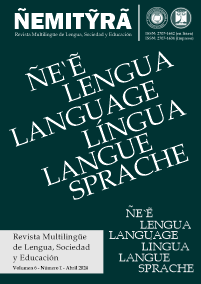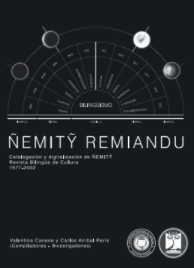The Emotional Journey of Female Novice Researchers in Mexico
DOI:
https://doi.org/10.47133/NEMITYRA20240601-A3Palabras clave:
Social-emotional learning (SEL), female English language teachers, teaching and research, social expectations, teachers and researchers’ well-beingResumen
Doing research has become part of language teachers’ academic demands in many educational institutions around the world. This article presents the findings of a qualitative narrative inquiry that explored the emotional landscape of a group of Mexican female language teachers who were entering the field of research. The transition from teaching to research involves a process of insights and awareness of the factors that affect the emotional status of female novice researchers. Their narratives evidenced their personal and professional struggles and their emotional labor. The findings reveal a complex interplay of emotions identified through the Pratham Life Skills framework within the social-emotional learning (SEL) approach. The study highlights the importance of acknowledging and addressing these emotional facets in the academic career trajectories of female researchers, with the goal of fostering their well-being and a more inclusive and supportive academic environment in the language teaching and learning research field.
Referencias
Bailey, A. & Corrales, K. A. (2020). Insight into novice research: A critical review of ELT masters' theses. MEXTESOL Journal, 44(4), 1-11.
Bamberg, M. (2006). Stories: Big or small. Why do we care? Narrative Inquiry, 16(1), 139–147. doi:10.1075/ni.16.1.18bam
Bamberg, M. (2016). Narrative inquiry. In K. B. Jensen & T. T. Craig (Eds.), The international encyclopedia of communication theory and philosophy (pp. 1295-1303). John Wiley & Sons, Inc. doi:10.1002/9781118766804.wbiect239
Bamberg, M. (2020). Narrative analysis: An integrative approach – Small stories and narrative practices. In M. Järvinen & N. Mik-Meyer (Eds.), Qualitative analysis: Eight traditions (pp. 243-264). Sage Publications.
Banreji, R. (2021). Learning for all: Lessons from ASER and Pratham in India on the role of citizens and communities in improving children's learning. In S. Ra et al. (Eds.), Powering a learning society during an age of disruption (pp. 167-182). Springer. doi:10.1007/978-981-16-0983-1_13
Barkhuizen, G. (2010). An extended positioning analysis of a pre-service teacher's better life small story. Applied Linguistics, 31(2), 282–300. doi:10.1093/applin/amp027
Barkhuizen, G. (2014). Narrative research in language teaching and learning. Language Teaching, 47(4), 450-466. doi:10.1017/S0261444814000172
Barkhuizen, G. (2011). Narrative knowledging in TESOL. TESOL Quarterly, 45(3), 391–414. doi:10.5054/tq.2011.261888
Barkhuizen, G., Benson, P., & Chik, A. (2014). Narrative inquiry in language teaching and learning research. Routledge.
Barkhuizen, G. (2016). A short story approach to analyzing teacher (imagined) identities over time. TESOL Quarterly, 50(3), 655-683. doi:10.1002/tesq.311
Benesch, S. (2018). Emotions as agency: Feeling rules, emotion labor, and English language teachers' decision-making. System, 79, 60-69. doi:10.1016/j.system.2018.03.015
Borg, S. (2013). Teacher research in language teaching: A critical analysis. Cambridge University Press.
Castillo, O. M. & Salas, S. L. A. (2021). English as a key element in the empowerment of undergraduate ELT female students. MEXTESOL Journal, 45(1). Retrieved from https://www.mextesol.net/journal/index.php?page=journal&id_article=23335
Connelly, F. M. & Clandinin, D. J. (2006). Narrative inquiry. In J. L. Green, G. Camilli, & P. B. Elmore (Eds.), Handbook of complementary methods in education research (3rd ed., pp. 375–385). Lawrence Erlbaum.
Creswell, J. W. (2014). Research design: Qualitative, quantitative, and mixed methods approaches (4th ed.). Sage.
Creswell, J. W., & Creswell, J. D. (2018). Research design: Qualitative, quantitative, and mixed methods approaches (5th ed.). Sage.
Day, C. & Lee, J. C. K. (Eds.). (2011). New understandings of teacher's work: Emotions and educational change. Springer.
De Costa, P., Rawal, H., & Li, W. (2018). Teachers' emotions: A sociopolitical and ideological perspective. In J. de Dios Martinez Agudo (Ed.), Emotions in second language teaching: Theory, research and teacher education (pp. 71-85). Springer. doi:10.1007/978-3-319-75438-3_6
Eraut, M. (2011). How researching learning at work can lead to tools for enhancing learning. In M. Malloch, L. Cairns, L. Evans, & B. O'Connor (Eds.), SAGE handbook of workplace learning (pp. 181–197). Sage.
Farrell, T. S. C. (2015). Promoting teacher reflection in second language education: A framework for TESOL professionals. Routledge.
Farrington, C. A., Roderick, M., Allensworth, E., Nagaoka, J., Keyes, T. S., Johnson, D. W., & Beechum, N. O. (2012). Teaching adolescents to become learners: The role of noncognitive factors in shaping school performance: A critical literature review. University of Chicago Consortium on Chicago School Research.
Fay, B. (1987). Critical social science. Cornell University Press.
Figueroa Pliz, A. & Ortega Olivares, M. (2010). Condición de género y elección profesional: El área de físico matemático en las mujeres. Investigación y Ciencia de la Universidad Autónoma de Aguascalientes, 46, 18-27.
Flores Salgado, E. & Flores Salgado L. L. (2022). Percepción de mujeres en las áreas de humanidades y ciencias sociales. Opción, 38(28), 51-70. doi:10.5281/zenodo.7278464
Freire, P. (1970). Pedagogy of the oppressed (M. B. Ramos, Trans.). Continuum Press. (Original work published 1968)
Golombek, P., & Doran, M. (2014). Unifying cognition, emotion, and activity in language teacher professional development. Teaching and Teacher Education, 39, 102–111. doi:10.1016/j.tate.2014.01.002
Gumora, G., & Arsenio, W. F. (2002). Emotionality, emotion regulation, and school performance in middle school children. Journal of School Psychology, 40(5), 395–413. doi:10.1016/S0022-4405(02)00108-5
Gupta, R. (2021). The role of pedagogy in developing life skills. Margin: The Journal of Applied Economic Research, 15(1), 50-72. doi:10.1177/0973801020974786
Hareli, S., & Rafaeli, A. (2008). Emotion cycles: On the social influence of emotion in organizations. Research in Organizational Behavior, 28, 35-59. doi:10.1016/j.riob.2008.04.007
Hascher, T. (2007). Exploring students' well-being by taking a variety of looks into the classroom. Hellenic Journal of Psychology, 4(4), 331-349.
Hasrati, M. (2013). Material and credentialing incentives as symbolic violence: Local engagement and global participation through joint publication. Journal of Business and Technical Communication, 27(2), 154-179. doi:10.1177/1050651912468886
Kirkwood, M., & Christie, D. (2006). The role of teacher research in continuing professional development. British Journal of Educational Studies, 54(4), 429-448. doi:10.1111/j.1467-8527.2006.00355.x
Méndez García, E. (2019). Are ELT undergraduate thesis-writers novice EFL teacher researchers? A case study with in-service teachers. MEXTESOL Journal, 43(2). Retrieved from https://www.mextesol.net/journal/index.php?page=journal&id_article
Méndez García, M. C., & Fabela Cárdenas, M. A. (2014). Emotions and their effects in a language learning Mexican context. System, 42, 298-307. doi:10.1016/j.system.2013.12.006
Méndez, M. (2012). The emotional experience of learning English as a foreign language in Mexico. La Editorial Manda.
Montiel, A. V. (2015). News media coverage of women. Asia Pacific Media Educator, 25(2), 182-193. doi:10.1177/1326365X15604260
Mercer, S. (2011). The self as a complex dynamic system. Studies in Second Language Learning and Teaching, 1(1), 57-82. doi:10.14746/ssllt.2011.1.1.4
Mercer, S., & Gregersen, T. (2020). Teacher wellbeing. Oxford University Press.
Osher, D., Kidron, Y., Brackett, M., Dymnicki, A., Jones, S., & Weissberg, R. P. (2016). Advancing the science and practice of social and emotional learning: Looking back and moving forward. Review of Research in Education, 40(1), 644-681. doi:10.3102/0091732X16673595
Pavlenko, A. (2013). The affective turn in SLA: From 'affective factors' to 'language desire' and 'commodification of affect'. In D. Gabryś-Barker & J. Bielska (Eds.), The affective dimension in second language acquisition (pp. 3-28). Multilingual Matters.
Pratham. (n.d.). Every child in school and learning well. Retrieved from https://www.pratham.org/
Pekrun, R., Goetz, T., Titz, W., & Perry, R. P. (2002). Academic emotions in students' self-regulated learning and achievement: A program of qualitative and quantitative research. Educational Psychologist, 37(2), 91-105. doi:10.1207/S15326985EP3702_4
Pentón Herrera, L. J. (2020). Social-emotional learning in TESOL: What, why, and how. Journal of English Learner Education, 10(1), 1. Retrieved from https://stars.library.ucf.edu/jele/vol10/iss1/1
Pentón Herrera, L. J., Trinh, E. T., & Gómez Portillo, M. D. J. (2021). Cultivating calm and stillness at the doctoral level: A collaborative autoethnography. Educational Studies. Advance online publication. doi:10.1080/00131946.2021.1947817
Pratham. (2018a). The Second Chance Program: Overview of the program and course modules (Part I). Pratham Education Foundation.
Pratham. (2018b). The Second Chance Program: Overview of the program and course modules (Part II). Pratham Education Foundation.
Punch, K. F. (2014). Introduction to social research: Quantitative & qualitative approaches (3rd ed.). Sage.
Rahimi, M., Yousofi, N., & Moradkhani, S. (2019). Exploring the professional identity construction of ELT researchers in higher education. Teaching English Language, 13(2), 85–117. doi:10.22132/tel.2019.87594
Silverman, D. (2011). A very short, fairly interesting, reasonably cheap book about qualitative research (2nd ed.). Sage.
Simon-Maeda, A. (2004). The complex construction of professional identities: Female EFL educators in Japan speak out. TESOL Quarterly, 38(3), 405–436. doi:10.2307/3588347
Scherer, K. R. (2005). What are emotions? And how can they be measured? Social Science Information, 44(4), 695-729. doi:10.1177/0539018405058216
Shehadeh, A. (2019). Leadership in publishing research: Nurturing and training young researchers. In W. Zoghbor, S. Al-Alami, & T. Alexiou (Eds.), Proceedings of the 1st Applied Linguistics and Language Teaching Conference: Teaching and learning in a globalized world (pp. 60–70). Zayed University Press.
Tran, A., Burns, A., & Ollerhead, S. (2017). ELT lecturers' experiences of a new research policy: Exploring emotion and academic identity. System, 67, 65-76. doi:10.1016/j.system.2017.04.014
UNESCO. (2021). UNESCO Science Report: The race against time for smarter development. Retrieved from https://unesdoc.unesco.org/ark:/48223/pf0000377456/PDF/377456eng.pdf.multi.page=1&zoom=auto,-16,842
van Dijk, T. A. (2001). Critical discourse analysis. In D. Tannen, D. Schiffrin, & H. Hamilton (Eds.), The handbook of discourse analysis (pp. 352-371). Blackwell.
Wolff, D., & De Costa, P. I. (2017). Expanding the language teacher identity landscape: An investigation of the emotions and strategies of a NNEST. The Modern Language Journal, 101(S1), 76-90. doi:10.1111/modl.12370
Yazan, B., Trinh, E., & Pentón Herrera, L. J. (2023). Doctoral students' identities and emotional wellbeing in applied linguistics: Autoethnographic accounts. Routledge.
Yuan, R., & Lee, I. (2014). Understanding language teacher educators' professional experiences: An exploratory study in Hong Kong. The Asia-Pacific Education Researcher, 23(1), 143-149. doi:10.1007/s40299-013-0117-6
Zembylas, M. (2007). Theory and methodology in researching emotions in education. International Journal of Research & Method in Education, 30(1), 57–72. doi:10.1080/17437270701207785
Publicado
Número
Sección
Licencia
Derechos de autor 2024 Leticia Araceli Salas Serrano; Elizabeth Flores Salgado; y Revista Ñemitỹrã

Esta obra está bajo una licencia internacional Creative Commons Atribución 4.0.










